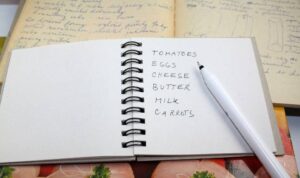Making sure your family gets all the necessary nutrients from mealtime doesn’t have to break the bank. We’ve put together our favourite ‘frugal’ hacks and tips to keep your family healthy on an affordable budget.
- Your freezer is your best friend!
If you have a good-sized freezer, then make the most of it. Ample freezer space means you can batch cook your meals (buying in bulk is often cheaper, so meal prepping is a great way to feed your family cost effectively) and store leftovers, too.
Stock up on your family’s favourite fruit when it’s in season, and cheaper, and then pop it in the freezer! This way, you’ll not spend a fortune on out of season fruit, you’ll avoid any waste, and you can make delicious chilled smoothies or a refreshing cold snack when the kids are feeling peckish.
Putting fresh fruit in the freezer when it’s in season is also a great way to access nutrients like vitamin C during the colder months. It’s important to make sure your family are boosting the amount of fruit and veg in your diet, especially during the winter, and frozen fruit is essentially like-for-like with fresh produce when it comes to nutritional value.
- Look in the reduced section
To avoid waste, supermarkets will put food that is approaching its sell-by date into a ‘yellow sticker’ reduced section. They aren’t able to sell it after this date has passed, so they sell it at a reduced price.
Although the best before date might be the following day, you can still pop stuff in the freezer to keep for longer! Hitting the reduced shelf is a fantastic way to fill up your freezer without spending a fortune. It’s also an opportunity to grab a treat that you usually wouldn’t pick up or be able to afford.
While the best bargains can usually be found in the evening, reductions are made all day, so make sure to always check the reduced section when you hit the supermarket.
- Bulk out your meals
Adding meat to your shopping trolley can hike the total price up by a fair whack, but what else is there to do if you’re trying to cook a delicious chicken curry for dinner? Simple – bulk your meals out with other, cheaper, ingredients! (Plus, this is a great way to add extra veg nutrients to your meals!)
Some of our favourite ingredients to use when bulking out meals include:
- Red lentils – great for stews, casseroles, curries
- Porridge oats – bulk out mince dishes by adding a handful or two of porridge oats (or flour also works)
- Beans – baked beans are a great addition to shepherd’s pie or tomato-based pasta dishes, and kidney beans work well in stews and chilli
- Potatoes – a great addition to stews, casseroles, and curries. Check out one of our favourite potato curry recipes here!
Fun fact!
Did you know, people originally started eating Yorkshire Puddings as a starter before their roast dinner, because they were cheap and bulky so would fill people up before their main meal?
- Stick to one weekly shop
It may be easier at times to shop little and often, but this can mean you end up spending more overall on feeding your family.
Planning ahead, writing a list, and sticking to one weekly food shop means you’ll avoid buying things you don’t need and wasting money. By planning ahead, you can also schedule in meals with similar ingredients. For example, if you plan a roast chicken dinner on Sunday, you can use the leftovers for Monday night’s dinner – chicken broth!
Adding on to this, make sure you don’t do your weekly shop on an empty stomach! Everyone knows that shopping when you’re hungry makes you more likely to impulsively buy food that you don’t need.

- Find out if you’re eligible for Healthy Start
You might be eligible for the NHS Healthy Start scheme, which can help pregnant women and families with young children who are on a low income to buy healthy food and milk, as well as free vitamins.
If you qualify for the scheme, you will be sent a Healthy Start card with money on it, that you can use in some UK shops to buy your family:
- Plain liquid cow’s milk
- Fresh, frozen, and tinned fruit and vegetables
- Fresh, dried, and tinned pulses
- Infant formula milk based on cow’s milk
You can also use your card to collect free vitamins for pregnancy and breastfeeding, and vitamin drops for babies and young children. Your money will be added to the Healthy Start card every four weeks.
Find out if you are eligible for this scheme and how to apply.




